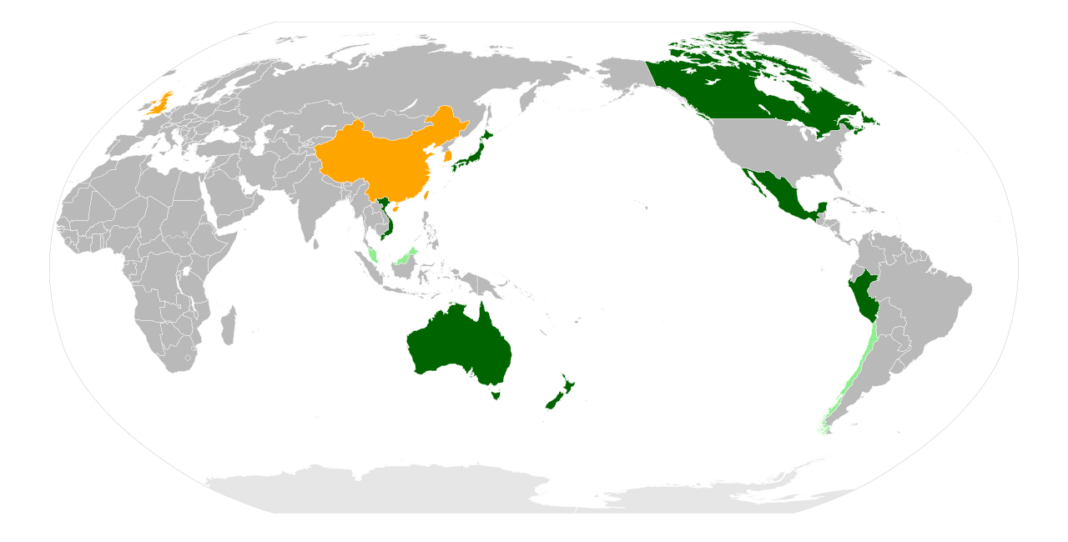31 MARCH 2023 | NEWS
The United Kingdom is to become the first European country to join the Comprehensive and Progressive Agreement for Trans-Pacific Partnership (CPTPP).
It is understood in Westminster that the accession was finalised during a telephone call with Business and Trade Secretary Kemi Badenoch around 1am this morning.
Ms Badenoch said it would boost the UK economy by £1.8bn, albeit only “in the long run”. The bloc covers a $10 trillion market, accounting for 15% of global trade.
“This is a huge moment for our country,” she said in a statement, adding: “It gives us new access to the world’s most dynamic markets, putting the UK at the heart of the Indo-Pacific region, where the majority of the world’s middle-class consumers will live in the decades ahead.”
The news comes as the ONS revealed that UK GDP grew by 0.1% in the final quarter of last year, narrowly avoiding a recession. However, the UK remains the only G7 country not to have recovered its GDP to pre-pandemic levels.
But the Leader of the Opposition downplayed the move – which has been in the works for almost two years – saying at an event in Plymouth that any benefits to the UK economy would amount to no more than 0.08%.
The Labour leader added: “I welcome any trade deal, but I have to say we need to bear in mind that the net contribution to our economy will be something in the order of 0.08 percent.
“What we need alongside that is a closer trading relationship with the EU. Businesses across the country are crying out for a better deal than the one that the Government has put in front of them.
“So yes, good to have a new trade deal, but better to have a closer relationship with the EU to go alongside it and to help our businesses grow our economy and take us through and out of this cost-of-living crisis.”
With a market covering around 500 million people, the trading bloc comprises Australia, Brunei, Canada, Chile, Japan, Malaysia, Mexico, New Zealand, Peru, Singapore and Vietnam.
However, aside from Brunei and Malaysia, the UK already has free trade deals with all the rest of these countries. Some of these had been rolled over from its previous membership of the EU, with those countries not seeking any significant alterations to their present trading arrangements with the UK.
Prime Minister Rishi Sunak hailed the “real economic benefits of our post-Brexit freedoms”, saying: “As part of CPTPP, the UK is now in a prime position in the global economy to seize opportunities for new jobs, growth and innovation.
“British businesses will now enjoy unparalleled access to markets from Europe to the South Pacific.”
Meanwhile, Ms Badenoch has compared accession to the trading bloc to “buying a start-up”. Speaking on Radio 4’s Today programme, she told listeners: “This is not to replace EU trade – this is in addition. We are still in a free trade agreement with the EU.”
She added: “You wouldn’t buy a small company like that and expect it to be delivering on the day – we are thinking about the potential … 40% of the world’s middle class is going to come from that region” in seven years’ time.
Denying that the new deal could harm competitiveness for UK farmers, Ms Badenoch said it would instead “create new markets” for the agriculture sector.
Labour’s Shadow International Trade Secretary, Nicholas Thomas-Symonds, called the development “encouraging”, but highlighted concerns over “consumer safety, food safety, data protection and environmental protections”.
But the Government insists that there will be other benefits that come from the new arrangement. Economically, these will include improved access to the services market in Asia for UK companies, which will no longer need to establish a regional base in those countries in order to trade. This will put them on an equal footing with local firms.
Meanwhile, geopolitically, the UK’s membership of the CPTPP will also enable it to veto applications to join from other countries, such as China, which has also been vying to join the group.
Describing the trade alliance as a “vital economic bulwark” against China, former Prime Minister Liz Truss said today: “I would expect the British Government – now or in the future – to oppose any such proposal.”
The final legal and administrative steps required for the UK to formally join the trading bloc are anticipated over the course of this year.

























